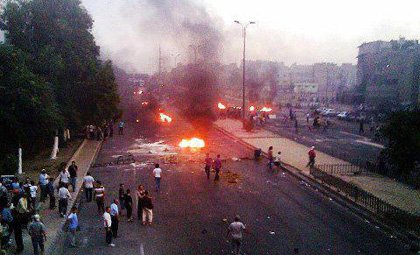
This particular article, courtesy of Al Jazeera, describes the intensified fighting between the Syrian Army and the rebel Free Syrian Army in Damascus. Aside from gaining footholds in the agricultural area Ghouta, rebels are becoming ever close to taking full control of Damascus International Airport. The increased fighting has essentially shut down the airport to minimal, if any civilian use. The majority of flights coming into Damascus are either military equipment and troops flown in from Iran or diplomats having to fly in from Beirut. The small number of civilian sorties coming into Damascus do so at great risk, given the close proximity of skirmishes. On the rebel side, troop reinforcement has also progressed according to a statement made by the Syrian Revolution General Commission. The article also went into detail describing fighting in the eastern city of Deir az-Zor, bordering Iraq's western border and in the Barzeh, Jubar, and Qaboon suburbs of Damascus.
This article should garner interest among individuals due to unique spread of conflict the country is undergoing. In the beginning of 2012, many thought that the conflict would be contained in the major cities of Damascus and Aleppo, ending with a decisive victory for President Assad's regime. Clearly, as current events have indicated, this was not the case. Many then should be shocked at the success of the activist groups such as the Free Syrian Army, Muslim Brotherhood, and the Syrian National Council. To date, the rebels have been able to instigate fighting in all major population centers of the country and now may possibly be able to take control of a major transportation hub, being Damascus International airport. By the end of 2012 and into the early months of 2013, the success of the rebels has pushed Syria into a full-on civil war.
Theories that we have discussed in class show the process of how a weak state such as Syria can be rebuilt. Neo-trustteeship, a proxy leader is needed until a working government can take over the vacuum of state leadership and can work with international bureaucracies. A emphasis on strong state institutions that support property rights and rule of law is also essential.
Despite the huge international interest in the country, it's still difficult to say what the future holds for Syria. The article's interviewee had a more optimistic prediction, stating that with international help, the country could come to a solution through agreement between the two domestic groups. Others are also hoping for an international presence in Syria, especially from the United States. A strategy for president Obama could be to preserve what is left of Syria by enforcing a no fly zone and arming non-jihadist rebels.
http://www.bellenews.com/wp-content/uploads/2012/09/Further-heavy-fighting-took-place-today-in-Damascus-and-the-northern-city-of-Aleppo.jpg?328b4c
http://www.aljazeera.com/news/middleeast/2013/03/2013316133433170554.html

I find the suggestion of arming the rebels as a possible U.S. strategic maneuver in Syria an interesting idea. If the U.S. were to take this step it would appear as if the West were taking the position of supporting the rebel side of the conflict. It seems up to this point in the conflict, we have not yet taken a side but rather called for a cease fire of both sides and talks for negotiations between the state and rebels. If this is the direction the U.S. were to take with Syria I'm curious to see how the conflict would continue to play out since the U.S. does not really have any major economic risks through taking the side against the Syrian State.
ReplyDeleteI also think the suggestion of arming the rebels as a course of action is an interesting suggestion. Usually I tend to believe America should stay out of conflicts if we can, especially in the Middle East where there seems to be violence and uprisings on the regular. However, the author of this blog mentions that there is huge international interest in Syria. This makes everything even more complicated and makes any move that Obama makes intensified. My concern is that if America helps the non-jihadist rebels in Syria, people in other movements in the Middle East will begin to expect help from America. They may feel that if they follow the path of the Syrian rebels, they will receive aid from out country or other nations in the west. While I am still debating whether helping the Syrian rebels is the right thing to do, portraying the idea that America will come to any rebel group's aid is a dangerous road to travel down. I am truly torn between helping the good people of Syria, or protecting American lives and not spending ridiculous amounts of money to become involved in a war that does pertain to us.
ReplyDelete